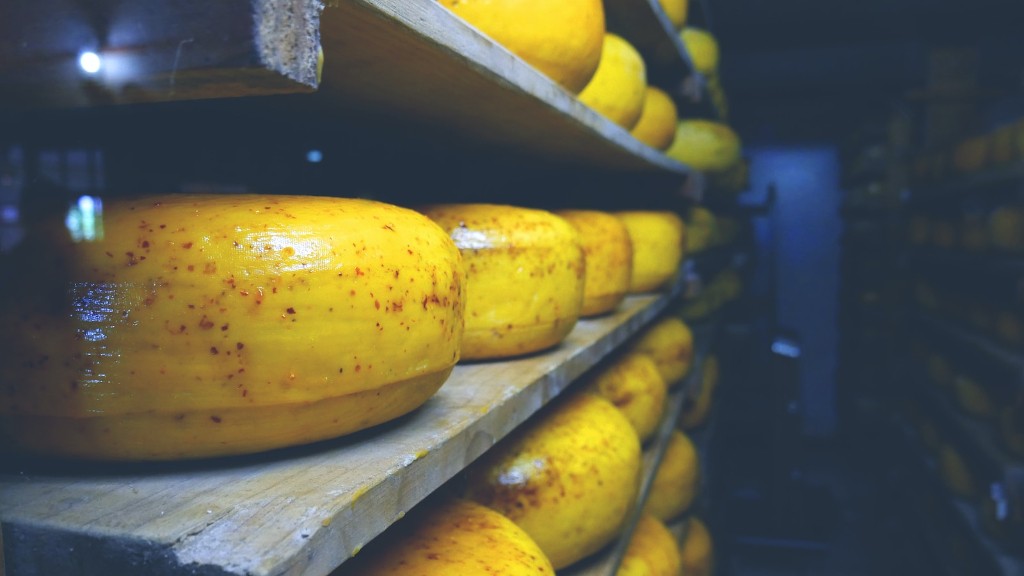Types of Diarrhea
Diarrhea is defined as experiencing loose, watery stools more than three times a day. It can be a sign of gastrointestinal problems and be symptomatic of various illnesses. There are two major categories of diarrhea: acute and chronic. Acute diarrhea usually resolves itself within a week while chronic diarrhea typically lasts two weeks or longer. Additionally, diarrhea can also be classified as traveler’s diarrhea, osmotic, infectious, secretory or post-infectious.
Cheese and Diarrhea
When it comes to eating cheese with diarrhea, the answer is twofold. Generally, no more than two servings of any food (including cheese) should be consumed each day when you are experiencing diarrhea, as it can slow down your digestive speed and ensure proper hydration.
In terms of specific kinds of cheese, people with diarrhea should avoid heavily processed and unripened cheeses since these types of cheeses tend to contain more fat and generally take longer to digest. However, soft and ripened cheeses (such as cheddar, Mozzarella) are safe to eat in moderation, as long as it is part of an overall balanced meal. Eating cheese with meals can also help reduce the effects of diarrhea and replenish electrolytes.
There are some types of cheese that are not recommended when feel you the effects of diarrhea. Cheese with blue or orange mold grows, such as blue cheese, should be avoided. Additionally, people with diarrhea should steer clear of anything made with aged or unprocessed cheeses, such as feta, halloumi or even ricotta, as these are linked with a higher risk of digestion-related ailments.
Advice for Eating Cheese & Diarrhea
The best advice for people with diarrhea is to monitor their diet to try to identify which foods are causing the symptoms. People with diarrhea should always be mindful of what they are eating and try to add more whole, natural, and unprocessed food to their diets. Additionally, they should aim to include probiotic-rich foods, such as yogurt, kimchi, sauerkraut, as these have been found to reduce digestive issues.
When it comes to cheese and diarrhea, it is best to opt for softer and ripened cheese varieties since they are easier to digest and can help alleviate the severity of symptoms. Additionally, people with diarrhea should always remember to hydrate adequately, as dehydration can often worsen the symptoms of diarrhea. Finally, those with chronic or traveler’s diarrhea should consider seeking medical attention for further advice on how to manage their condition.
Benefits of Eating Cheese with Diarrhea
Eating cheese with diarrhea can be beneficial when eaten in moderation. Cheese is a great source of calcium, protein, and vitamin B12, all of which can help reduce the severity of diarrhea. Calcium helps strengthen the immune system, which can help fight off any potential infections or illnesses. Additionally, cheese is an excellent source of probiotics which help the digestive process. Furthermore, cheese helps replenish lost electrolytes due to diarrhea and can provide a boost of energy.
Side Effects of Eating Cheese with Diarrhea
However, consuming too much cheese can have some adverse effects. As cheese is a dairy product, it can be difficult for people with digestive issues such as diarrhea to process. Dairy products can be difficult to digest, which can lead to uncomfortable bloating, gas and abdominal pain. Additionally, consuming large amounts of saturated fat, which cheese and other dairy products contain, can increase the risk of obesity and other health-related issues. Eating cheese with diarrhea should be done in moderation, as too much can worsen symptoms and lead to other digestive issues.
Alternatives to Eating Cheese with Diarrhea
For those with diarrhea, there are plenty of alternatives to eating cheese. Plant-based milks such as almond milk can provide a dairy-free source of calcium. Additionally, avocados, flaxseeds, salmon and sardines are all excellent sources of healthy fats and protein. Plant-based yogurts are good sources of probiotics and fiber, which can aid digestion. Finally, soy products such as tofu and tempeh can provide protein, fiber, and probiotics in one meal.
The Best Practices when Eating Cheese with Diarrhea
When it comes to eating cheese with diarrhea, it is important to pay close attention to the types consumed. Cheese that is heavily processed and unripened should be avoided, as it tends to take longer to digest and can exacerbate symptoms. Soft and ripened cheeses, such as cheddar and Mozzarella, are safe to eat in moderation. Additionally, people should be mindful of the amount of cheese they are eating, as large amounts can increase the risk of digestive issues. Finally, those with chronic and traveler’s diarrhea should consider seeking medical advice on how to manage their condition.


